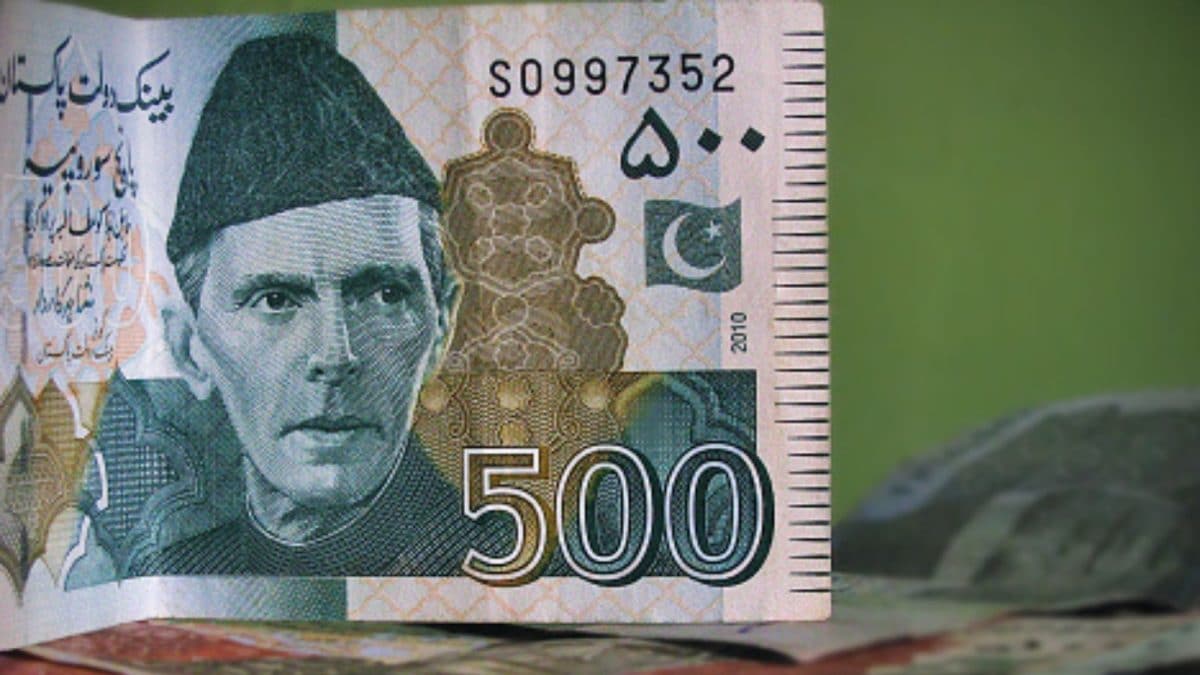Last Updated:
With over 40% of returns filed by September 27, showing nil earnings, these tax evaders are not struggling shopkeepers; they are doctors, traders, property barons living large

In 2024, nearly half of Pakistan’s 5.9 million tax filers—some 3 million people—claimed no taxable income, a trend still continuing in 2025. (Getty Images)
In the heart of Lahore’s upscale DHA enclave, many can be seen with their gleaming sedans, sprawling mansions, and some boasting of attending a wedding bash costing crores in Dubai. But their tax returns tell a different story: zero income, zero tax.
Recommended Stories
In 2024, nearly half of Pakistan’s 5.9 million tax filers—some 3 million people—claimed no taxable income, a trend still continuing in 2025, with over 40% of returns filed by September 27 showing nil earnings. These tax evaders are not struggling shopkeepers; they are doctors, traders, and property barons living large while Pakistan begs the International Monetary Fund (IMF) to keep its economy afloat.
This is not just a tax problem — it is a national emergency gutting Pakistan’s economy. With only 2% of 240 million people paying income tax and a tax-to-GDP ratio languishing at 10%—among Asia’s lowest—evasion is not a side hustle; it is the backbone of a system riddled with loopholes, toothless enforcement, and political cowardice.
Why do millions of Pakistanis get away with declaring nothing? Why does the government shy from cracking down on elites flaunting their wealth? And how is this broken tax regime choking an economy drowning in $130 billion of debt? Let us dive into Pakistan’s income tax mess, the evasion epidemic, and the devastating fallout for a nation on the brink.
What Is Pakistan’s Tax Evasion Epidemic?
Reports show that Pakistani taxpayers declaring zero income own mansions worth crores, drive imported SUVs, and fund weddings that dwarf the average Pakistani’s lifetime earnings. Last year, nearly 3 million of 5.9 million tax returns filed with the Federal Board of Revenue (FBR) reported no taxable income. By September 27, 2025, over 40% of submissions followed suit, even as filers flaunt luxury on social media—think Rolexes, Maldives getaways, and Rs 30 crore nuptials.
In several reports, a senior FBR official put it bluntly: These are not the poor; they are the affluent, hiding wealth in cash, offshore accounts, and undocumented properties.
The numbers expose a systemic rot. Pakistan’s 6 million active taxpayers—2.5% of 240 million people—contribute just 1% to GDP via income tax. Compare that to India’s 12% tax-to-GDP or Bangladesh’s 9%. Evasion thrives in the undocumented economy—40-50% of GDP—where cash trades, real estate flips, and hawala deals shield fortunes. Doctors, lawyers, and retailers, dubbed “non-filers,” dominate this shadow world, paying little while the state leans on indirect taxes like 18% GST, which crush the poor.
Why Has There Been No Crackdown?
Why does evasion flourish unchecked? Pakistan’s income tax regime, rooted in the 2001 Income Tax Ordinance, is a house of cards. Its cornerstone—universal self-assessment—lets taxpayers declare earnings without upfront checks. The FBR trusts filings, relying on audits that rarely happen—only 1-2% of returns are reviewed yearly, crippled by understaffing and outdated tech.
Third-party data, like bank records or property deeds, remain unused and unlinked to returns. Political interference buries the rest: Many evaders are powerful elites, including lawmakers who under-report their income by 70%, per a 2023 FBR probe. Yet, they face no repercussions.
Enforcement is a farce. Whistle-blower rewards capped at Rs 5 million is too low to tempt tipsters. Confidentiality leaks deter insiders like staff or neighbours spotting yachts. The FBR’s 2025 “Lifestyle Monitoring Cell”— a 40-person team scanning social media for mismatches like Rs 30 crore weddings — lacks scale. In terms of digitalisation, e-filing via the Iris portal exists, but integration with National Database and Registration Authority of Pakistan (NADRA) or banks is patchy, letting zero-income ghosts slip through.
With cash transactions constituting 80% of the economy, tax evasion becomes a reflex. High tax rates (up to 35% above Rs 6 million) and frequent hikes breed resentment, pushing even honest filers into the shadows. Corruption within the FBR—bribes for clean slates—erodes trust. Untaxed sectors like agriculture (22% of GDP) and real estate, hotbeds of benami ownership, remain sacred cows, protected by elite lobbying. Past crackdowns, like 2019’s amnesty scheme, flopped, collecting pennies while emboldening evaders.
About Pakistan’s Tax Regime
The Income Tax Ordinance 2001 is a patchwork of colonial legacy and half-baked reforms. It is progressive in theory: no tax up to Rs 600,000 annually, with slabs rising to 35% for incomes over Rs 6 million. Salaried workers face source withholding, netting 70% of collections. Businesses self-declare profits, with small traders under presumptive taxes (e.g., Rs 200,000 flat for retailers below Rs 50 million turnover). Non-filers—those earning above Rs 600,000 without returns—face penalties, but enforcement is weak.
Loopholes abound. Self-assessment invites fraud, with audits too rare to deter. Agriculture, exempt since the 1990s, lets landlords dodge billions. Real estate’s 15% capital gains tax is undermined by undervaluation and proxy deals. The Final Tax Regime caps liability for sectors like telecom, shielding high earners. Reforms—mandating filers for passports or property since 2022—boosted returns 20%, but digital gaps and political meddling stall progress. The FBR’s 2025 push—higher whistle-blower rewards (Rs 150 million), anonymity under Section 216, social media audits—aims to close gaps but lacks teeth without systemic change.
What’s The Economic Fallout Of Tax Evasion?
Tax evasion is bleeding Pakistan dry. FY2025 revenue hit Rs 9.3 trillion against a Rs 12.97 trillion target, leaving a Rs 3.67 trillion shortfall. External debt stands at $130 billion, with $30 billion due this year. Interest consumes 60% of the budget, starving education (1.7% of GDP) and health (0.9%). The IMF’s $7 billion 2024 bailout demands a broader tax base, but evasion mocks the goal, leading to more loans, money printing, and inflation spikes.
The undocumented economy—40-50% of GDP—drives a vicious cycle: Low revenue forces reliance on indirect taxes (18% GST, fuel excises), hitting the poor hardest. Inequality widens—Gini coefficient at 0.31, top 1% hold 9% of income. Growth lags at 2.4% in FY2025, below population growth, with reserves at $9 billion (three months’ imports). The rupee, down 20% since 2023, fuels import inflation, eroding savings. Brain drain surges—800,000 skilled workers flee yearly—while FDI limps at $1.3 billion, choked by instability.
Why India Should Be Cautioned
For India, Pakistan’s tax crisis is a mirror and a warning. With a stronger 12% tax-to-GDP ratio, India’s compliance culture—bolstered by Aadhaar-linked filings and GST digitalisation—shows what Pakistan lacks. Yet India’s own evasion battles, like benami property, echo across the border.
Pakistan’s collapse risks regional ripples: refugee flows, trade disruptions, and a weaker SAARC. India’s $4 billion trade with Pakistan—textiles, pharma—could shrink if Islamabad’s economy tanks further. New Delhi watches closely, pushing digital tax models as a blueprint while bracing for spillover.
What’s Next?
The FBR’s Lifestyle Cell, sniffing out lavish weddings via Instagram, signals intent. Whistle-blower rewards jumping to Rs 150 million and Section 216 anonymity aim to spark tips. Digital links to banks and NADRA could verify 20% more returns by 2026. IMF pressure—$1 billion tranche tied to reforms—demands 7 million filers by FY26.
But history warns: Amnesty flops and elite capture endure. Real fixes include lower rates to 25%, full digitalisation, taxing agriculture lightly, and political willingness by the Pakistani government.
In this tax tragedy, evasion is not defiance; it is destruction. As elites declare zero taxes and the FBR flounders, 240 million Pakistanis need to pay the price. Without a reckoning, the Pakistani economy is not just broke — it is broken.
About the Author
Shilpy Bisht, Deputy News Editor at News18, writes and edits national, world and business stories. She started off as a print journalist, and then transitioned to online, in her 12 years of experience. Her prev…Read More
Shilpy Bisht, Deputy News Editor at News18, writes and edits national, world and business stories. She started off as a print journalist, and then transitioned to online, in her 12 years of experience. Her prev… Read More
September 30, 2025, 14:18 IST
Loading comments…
Scan the QR code to download the News18 app and enjoy a seamless news experience anytime, anywhere



